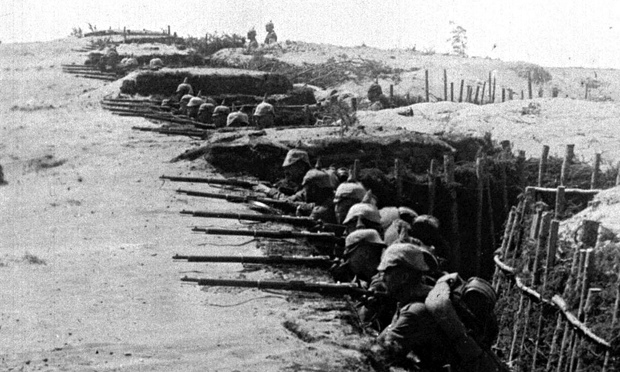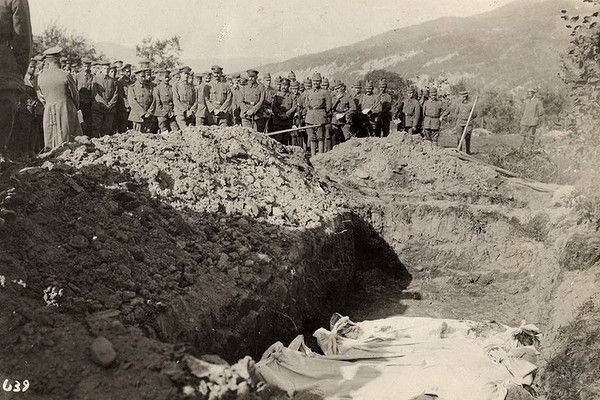Retreating Russian Troops Burn Towns, Farms;
Thousands of Non-Russians Uprooted
Special to The Great War Project
(15-17 May) On the often ignored Eastern Front, the German army is engaged in an enormous attack on the Russian forces in control of much of western Ukraine and Poland.
“In May 1915,” observes historian Adam Hochschild, “on the one section of the front where the Tsar’s armies had won substantial territory from the lackadaisical Austro-Hungarians, the Germans stiffened their ally with a strong infusion of troops and artillery and began methodically pushing the Russians far back into their homeland.”
This is territory the Russians capture in the winter of 1914-1915. The Germans and their Austrian allies are at first defeated as much by the mountainous terrain and frigid weather as by the prowess of the Russian army.
But now, five months later, like everything in war, things have changed. “The land had dried out,” writes historian Norman Stone, “and there would be no repetition of the calamitous…doings in the snows.”
Over the course of ten days at the end of April and the beginning of May a century ago, the Germans mass 100,000 men and 1,000 guns east of Cracow in present day Poland. Stone writes…
The Russians are in serious trouble. “Their entire position was about to explode.”
One big problem for the Russians: they move their troops more slowly than the Germans do. German railroads are far better and run more efficiently than the Russian system. One of the problems is horses. The Germans are moving far fewer horses than the Russians are.
And Russian communications are far more primitive than German communications.
“Everything, strategic and tactical, was in place for one of the great disasters of Russian military history,” Stone observes.
On May 2nd the Germans open up with an enormous artillery barrage on Russian positions, involving a thousand artillery pieces. “Quite soon,” observes Stone, “the Russian positions are reduced to rubble.”
Many of the Russian troops are raw and even over-age. They panic and run away over open ground. One-third of the Russian defenders are wiped out, according to Stone.
The Germans and Austrians open a five-mile gap in the Russian lines. By mid-May, they advance 300 miles, taking 200 Russian guns and 140,000 Russian prisoners. The Russians are running out of ammunition.
The Russians, Adam Hochschild reports, are losing 7,500 men each day, and there is no end in sight for the German-Austrian offensive.
For the Germans “an enormous opportunity was opening up,”
….reports Stone. “The whole of Russian Poland might be taken.” One panic-stricken front commander expresses the fear that his troops might have to withdraw as far east as Kiev in Ukraine.
Hochschild writes, “The new frontline left a wide swath of the Russian Empire – much of what today is Poland, Ukraine, Belarus, Latvia, and Lithuania – in enemy hands.” As the Russians retreat, “its troops destroyed crops, houses, railways, entire cities, anything that might be of use to the enemy.”
This land is becoming a land “where no food grew and few buildings stood.”
The battle is also uprooting thousands of people. “The retreating Russians,” Hochschild reports, “forcibly removed huge numbers of people. Targeted above all were non-Russian ethnic minorities, who the Tsarist government feared would cooperate with the German occupiers.
“After bayoneting and hanging some people to start with, pillaging, whip-wielding Cossacks and other troops drove at least half a million Jews from their homes.”
The Russians treat Poles, Lithuanians, and Latvians in similar fashion.
With stalemates on the Western Front in France and in Turkey at Gallipoli, with the German victories in the naval battle, and now with the Russians facing a crisis of epic proportions, it is a desperate moment for the Allies.



